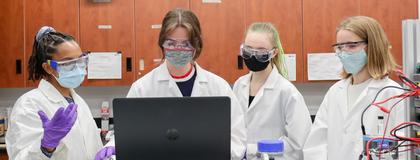
Neuroscience Co-op Information for Employers
Adding Value to Your Team
The University of Guelph’s Bachelor of Science in Neuroscience (NEUR) offers a comprehensive program that equips students with a strong foundation in the natural sciences and advanced knowledge of the nervous system's structure and function. The program emphasizes interdisciplinary problem-solving, allowing students to tailor their studies toward areas such as molecular and biomedical neuroscience, behavioral and cognitive neuroscience, or comparative neuroscience.
University of Guelph Advantage
- Academic Excellence: Our students are taught by renowned faculty who are leaders in neuroscience research, with expertise spanning critical areas like neurodegenerative and neurodevelopmental diseases, pain, addiction, stress and trauma, regeneration, repair, and the brain-gut connection. This advanced knowledge base ensures that our students bring cutting-edge insights and skills to their work.
- Long-Term Project Engagement: With co-op work terms lasting 4, 8 or 12 months, employers benefit from continuity, allowing students to take on substantial, long-term projects that drive real impact for your organization.
- Flexible and Employer-Friendly Hiring: Our co-op process is designed to meet the needs of employers. With the Experience Guelph hiring platform, posting jobs, conducting interviews, and making offers is simple, and works with your timelines.
Student Strengths
Strong Academic Foundation:
By their first work term, Neuroscience students have already built a strong foundation in Biological Sciences and completed key Neuroscience courses. This early grounding enables them to quickly contribute to scientific and research environments with a solid understanding of core concepts.
Hands-On Lab Experience:
Your co-op students will have practical laboratory experience, including proficiency with advanced microscopy techniques. Additionally, they have the option to conduct research in a neuroscience lab for credit, allowing them to apply their academic knowledge to real-world experiments and projects.
Advanced Expertise in Upper Years:
By their second work term, students possess in-depth knowledge of neuroscience through specialized courses and electives in neurobiology, health and disease, computational neuroscience, and psychology. This advanced training equips them to excel in complex roles requiring critical thinking and technical expertise.
Neuroscience Co-op Work Term Schedule
| YEAR | FALL | WINTER | SUMMER |
|---|---|---|---|
| ONE | Academic | Academic | Off |
| TWO | Academic | Academic | Work |
| THREE | Academic | Academic | Work |
| FOUR | Work | Work | Off |
| FIVE | Academic | Academic |
Neuroscience Course Sequencing
Please see the current undergraduate calendar for more information.
Fall
- Biological Concepts of Health
- General Chemistry I
- Elements of Calculus I
- Physics for Life Sciences
- 1 Liberal Education elective
Winter
- Discovering Biodiversity
- Introduction to Molecular and Cellular Biology
- General Chemistry II
- Physics for Life Sciences II
- Introduction to Psychology
Fall
- Introduction to Biochemistry
- Introduction to Co-operative Education
- Foundations in Molecular Biology and Genetics
- Foundations of Neuroscience I
- Statistics I or Making Sense of Data in Psychological Research
- 1 Liberal Education elective
Winter
- Molecular Biology of the Cell
- Foundations in Neuroscience II
- Behavioural Neuroscience II
- 2 electives or restricted electives
Summer
Work Term One
Fall
- Functional Mammalian Neuroanatomy
- Molecular Mechanisms of Neurological Disorders
- Cognitive Neuroscience
- 2 electives or restricted electives
Winter
- Principles of Pharmacology
- Techniques in Neuroscience
- 2 electives or restricted electives
Summer
Work Term Two
Fall
Work Term ThreeWinter
Work Term FourSummer
Off
Fall
- Current Issues in Neuroscience
- Neuropharmacology
- 3 electives or restricted electives
Winter
- 5 electives or restricted electives
See Undergraduate Calendar for list of Restricted Electives